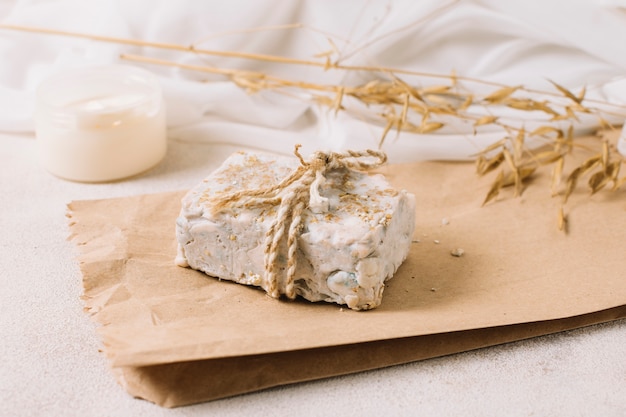
You won’t catch me serving oatmeal for breakfast, but I always have oats handy for DIY skincare tricks like these cleansing grains. An oatmeal bath is another fantastic way to use oats for skin care. People have been relying on oatmeal baths for centuries to heal damaged skin, and recent research only adds more proof to back this up.
Colloidal oatmeal is basically oats ground into super tiny particles, similar to colloidal silver. Manufacturers achieve this using special grinders or processes that involve cooking and drying whole oats. Colloidal oatmeal is crafted by grinding the whole oat, including the bran, into really small bits. Regular coffee grinders or kitchen food processors just can’t do the job.
Although oat flour is finer than what you can grind at home, its skin-benefiting bran is removed, making it not very useful for an oatmeal bath. So, why bother with a homemade oatmeal bath if we can’t make colloidal oatmeal? Well, ground whole oats are still good for the skin, even if they aren’t as fine. They may be a bit chunky for lotions, but they work wonderfully in a bath!
Let’s get into a bit of the science. The benefits of a soothing oatmeal bath are clear, but there’s a lot of science to support it. Colloidal oatmeal is excellent for dry or damaged skin because it acts as an emollient, creating a moisturizing layer that locks in hydration. A study from 2017 showed that people with eczema who used colloidal oatmeal saw over 82% improvement in their condition, and nearly 86% reported less itchiness. Another study from the same period found that oats help strengthen the skin’s barrier by regulating skin fats and balancing pH levels, which improved damage related to eczema.
One reason oatmeal baths are fantastic for treating eczema is their ability to reduce inflammation. A 2015 study demonstrated that colloidal oatmeal is anti-inflammatory and helps decrease inflammation-causing cytokines. Plus, several studies highlight that colloidal oatmeal acts as a powerful antioxidant for the skin. How? Oats have phenols which help absorb UV rays and reduce harmful inflammation.
It’s hard to go wrong with an oatmeal bath. Many skin conditions can benefit from a soak in an oatmeal bath. A 2012 meta-analysis reviewing the safety and effectiveness of personal care products containing colloidal oatmeal found that among over 445,000 users, there were very few adverse effects. However, there are still some things to watch out for.
Have you ever tried making your own oatmeal bath? Did it work for you?

